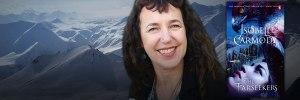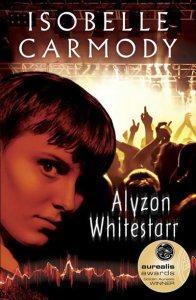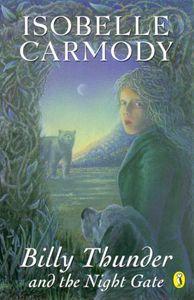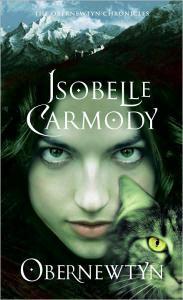With Oz Comic Con season starting up again here in Australia, I thought I might give you all a long overdue treat. Last year at Oz Comic Con in Perth we had the opportunity to interview the authors in attendance at the con, including the lovely Isobelle Carmody, but due to some technical difficulties and some life-related obstructions, I've only just been able to transcribe the interviews for you now.
Last year we sat down to talk to Isobelle Carmody about her work as an author, and we're very fortunate again this year Perth, because she'll be returning to Oz Comic Con in both Perth and Adelaide in 2017.

Isobelle Carmody is best known for her post-apocalyptic fantasy/sci-fi series, the Obernewtyn Chronicles, and I am personally a huge fan, so this interview goes for a very long time. I'd apologise, but I'm not really very sorry at all... And it really is worth the read!
Appa the Gypsy: Alright! So, welcome, Isobelle Carmody, to Comic Con in Perth.
Isobelle Carmody: Thank you. It's my first, and I'm very excited.
AtG: Yes, but not the first time you've been to Perth, is it?
IC: No, no. Just first Comic Con.
AtG: Yeah, we're very excited to have you here. I know I personally read your books when I was really, really young, so it's very exciting to meet you.
IC: Oh, well, it's lovely hearing these things (laughs).
AtG: Yeah, so, one thing I would like to ask is, you've got quite a lot of books that you've written, a lot of different series and short stories and things, so if you had to recommend to a new reader who's never read anything of yours before, something of yours to start with to get them hooked, what do you think you would recommend?

AtG: Yeah, so the final book in the Obernewtyn series ( The Red Queen) recently came out, so what's next on the agenda for you? What are you working on at the moment?
IC: Well, I'm actually doing a PhD, so I'm working on my PhD, and there's a novel connected to that, but that'll unfold over a few years, there's no rush for that. One of the beauties of it is that there's no rush. The very next thing that I'll be doing is that I'm doing some illustrations now for another little Children's book, one of the ones in the Kingdom of the Lost (series begins with The Red Wind), and then I'm finishing the Billy Thunder series ( The Gateway Trilogy beginning with Billy Thunder and the Night Gate), with the final book in that series, and next year my big push will be to do the final Darkfall book, so there's a Legendsong series book.

AtG: You've got a big job of finishing things off at the moment.
IC: Yeah, I know. It does feel like that. It feels like a couple of years of finishing things off. And they all reach fruition when they do, and it's not like it's deliberate, but somehow it does feel like that, yeah. That I'm in a finishing mode.
AtG: So, with your PhD, are you able to tell us a little bit about what that's about and what you're working on?
IC: Yeah, the story is called The Theatre of Death, and it's a contemporary novel, and there's fantastic pockets in it. It's made to look like realism, it should feel like realism, but there are really fantastical pockets in it as well. And my PhD is just to investigate some of the techniques by which writers like me, and Ursula Le Guin, looking at her work is part of my PhD, how we use the fantastic to engage real world stuff. Because I think that's how fantasy, really good fantasy, works. Because it lifts you above the everyday world but it touches deep philosophical themes. And so I'm just looking at the techniques by which we do those things. It's funny, because I don't think of them as techniques when I'm doing them, I just write, but what I'm doing now is looking at my own writing and watching myself work, so it's practice-led, trying to identify what it is that I actually do. And for me it's always been an instinctive, mysterious process that I let unfold, so now what I'm trying to do is watch myself to see what it is that I'm actually doing. I mean, it's really interesting. I wonder how it'll all change me, and how it'll affect the story that I'm writing. I would have thought that it might make it cold and distant, that it might be too thought out, but actually it's evading all that. The story itself seems to be evading all these attempts to pin it down, which is lovely in a way, too.
AtG: That sounds very interesting, because a lot of people do say that things like fantasy are purely escapism, but I know that I personally have found that books like that are a much easier way to deal with real world issues in a sort of more isolated way, with precision, because they're not effected by the rest of your real world around you, because it's a fantasy world.
IC: Yeah, and I think sometimes reality is a distraction. Like, if you wanted to talk about your and my relationship, we become friends, and we talk about it in this context, this context is very distracting, the real world, although (laughs) it is a pretty fantastic context.
AtG: It's not bad.
IC: But the real world context can get in the way, whereas if I was to put us in Mars on a spaceship that's just crashed on a planet that no one knows existed, and we were alone, that's another way of looking at us. And it enables me to put us under stress and look at how we react to that stress, and how our friendship stands up to that stress. So it clears away, it'll let you step back from reality in order to look at reality more clearly.
AtG: Yes! Yes, definitely. So, if you could pick one character from one of your books to grab a coffee with and have a chat, who do you think you would pick and why? What do you think you would talk about?

AtG: Yeah? So if you had a Misfit power, is that what you think you'd choose? To Beastspeak?
IC: I think it would be heart breaking to be a Beastspeaker.
AtG: Yes.
IC: Because to know what animals think and hear it and not be able to do anything about it, I think you would go mad in the world that we're in. You'd be and Arc (Animal Rights Coalition) Activist immediately, you'd become radical immediately, so I think that would be actually quite frightening. I mean, I think if that power were possible, I'd take it, but you'd get locked up in a mad house. And I think you would go mad from the pain of the creatures around you. I think what I'd like to have is Empathy, probably, most. Actually, I'd like to have a power that doesn't quite exist in the Obernewtyn Chronicles, although, well, it does exist. I'd like to be an Enthraller, I'd like to be able to make people feel what other people feel. So I'd like Projective Empathy... Maybe I'll give some character that, sometime. You will remember that this is the moment I thought of that.
AtG: Yeah, okay, we'll highlight that (laughs)
IC: Projective Empathy... I mean in some way, they do, the musicians, Angina and Mikey, they do that, they empathise emotions to other people. But they empathise emotions they choose, so they construct them and empathise them.
AtG: Yeah, they don't take them. Coz that scene where they're performing that play and everybody gets quite moved by it...
IC: Yeah, they create emotions like their art, like they're a story, and they offer that art to people in this sensory way. What I would like is this Projective Empathy in the sense that I could take the emotions of one thing, and make another feel them. Oh my god, that would be such a power. Imagine that? That means that a politician that makes a wrong decision, like all those refugees... The first thing I would do is make all those politicians feel like what those refugees feel like. And let them live that life. And I wouldn't do it constantly. I'd, every now and then, throw them into that life.
AtG: Just a little snapshot.
IC: So they'd feel it! Remind them again and again. I bet those policies would change in a microsecond.
AtG: Very, very quickly, definitely.
IC: That would be a great power to have...
AtG: Well, since we're talking about the animal activism and those kinds of things, obviously animal rights is quite a huge theme towards the middle of the Obernewtyn Chronicles. What was the challenge, I suppose, in trying to give the Obernewtyn characters a way to interact with animals now that they understood Beastspeaking, to make a more righteous world for those Beast characters?
IC: Well, I just feel that if we could speak to animals and they could speak to us, we would have to listen to them. I mean, it's true that we treat our own species pretty horribly and we don't listen, and we're fully capable of not listening, but I think it would be a shock for us too. Because I think we put animals on a pedestal, but we also eat them, you know? So we can do both. And it's a schizophrenic way of treating creatures.
AtG: Yeah, it's very interesting.
IC: And we idolise them as well. We admire their pictures, we post pictures of them, we adore them. Some animals we see as sacrosanct, some we don't. And so, I think if suddenly animals started to talk to us, I think our way of dealing with them would change. And what I did was, step by step, I tried to engage with 'what does it feel like to interact with these people?' and that's what I was doing from that moment onwards, pursuing that. I think, animal activists, I think they do empathise very strongly, and I know the causes that I'm involved in, it's hard for me not to empathise to the point of tears, and people feel really, really passionately, and I think they are empathising very strongly. They're not the problem. The problem is people who, they don't just not empathise, they seem to have no ability to empathise with anybody. So I think that might be a problem with animal activism too... I got sidetracked on that question you asked...
AtG: Ah, about the difficulty integrating the animals into the world.
IC: Yeah, I think it was a gradual process. It was a process of thinking through, okay so now we're starting to see this, what would happen next? What would logically happen next? That's what I wanted to say... I feel like there might be a trajectory where people feel somewhat cheated because one of her quests was to resolve, to let animals walk free from humans. Now, that's just her misinterpretation of her quest. Her quest was always to do this one thing, which, in the end, will change everything; to reintroduce species, to have the power to recreate habitats, to recreate animals, to bring them back to life again, it begins to change things completely. And it's a change from the other end. It means that the animals are now in the midst of being caught up in the changes in the Land, they're not the ones that her quest is connected to. Yet. In coming through Obernewtyn, and her quest was always posed as 'Obernewtyn is important to your quest', that's also important. That thread of your life is also important. Because everything she does, she changes things. And I think that in moving through the Land, even though she didn't set the animals free in the most obvious way, because how could that be? She said it herself a hundred times: how would that be possible? It wouldn't be possible. But there are other ways. Changing the way you think about them, she was a really big part of that.
AtG: Yeah, it was a huge step in the right direction.
IC: Yeah, slow, gradual change. But the ultimate that her quest is connected to, and therefore she's done it in two strands. So I would argue to people who would say 'But in the end she didn't do it, what about all the animals she left behind?' She didn't leave them behind. They're in a world that's changing because of her passage through it. So... (looks up at passing cosplayers) wow. You keep seeing amazing characters going by.
AtG: (laughs). So, having reached the end of the Obernewtyn series, which has been quite a long time sitting with that series, can you tell us a bit about the highs and lows of such an extensive publishing journey?

AtG: The character of Elspeth (from the Obernewtyn Chronicles), you spent a lot of time with her over the course of the series, what are the biggest ways you think that she has grown as a character?
IC: The biggest change, I think, in her is that she's softened and she's opened up. And she's allowed herself to care for people. And most importantly, she's allowed herself to need people. And that was something she really couldn't do in the first book, any more than I could, at fourteen when I was writing that book. I was completely closed off and I was trying to look after myself, I felt you had to look after yourself and you had to be closed up, and I was. And gradually Elspeth's quest is to open up in that way, and I guess it was mirroring my own quest of growing up and realising that you're not weakened by needing people, you're strengthened. And that interconnectedness is really, really important. And opening up and empathising and communicating and all those things that happened in the series was happening to me in life. And everything came to me as those things were opening up, all the things that came to Elspeth came to me too. And that was really something special. And she mirrors that, I think, very strongly.
AtG: Well, I know for me, what fascinated me most specifically as, when I was young, I think I must have been about fourteen myself when I picked up Obernewtyn to begin with, was that Elspeth had so much difficulty relating with other people and empathising with them. What drove you to make that such an important part of her character?
IC: I think just because it was an important part of my character. I was lonely, I was a misfit, I was isolated, I used to get beat up at school all the time. I was just this weird kid, and I was just reflecting all that. My dad had been killed in a car accident by a drunk driver who never went to jail for it, so I felt the world wasn't very just. So all those kind of things were really affecting me when I was writing the series.
AtG: So, we'll finish up there, because you've got a bit of a line building now. But just to end on, do you have any particular book recommendations or author recommendations that you would really love any of your readers to get into?
IC: My books, or other people's books?
AtG: Other people's books.
IC: Other people's books, okay. I really, really love Sheri Tepper as a writer. I think I really loved her Raising the Stones and Beauty was exquisite. I love her writing and I love how she writes. Ursula Le Guin is my goddess, I love anything she does. If you've never read her Earthsea series, you're mad. Get to it. But I also really love The Dispossessed. Brilliant, brilliant dystopian/utopian novel, science fiction, fantastic. And The Left Hand of Darkness is one of the most brilliant books ever written. And the other books that I've really loved is the Mouse and his Child, by Russell Hoban, with exquisite little drawings by Lillian Hoban. I love Tove Jansson, who wrote the Moomintroll books. Don't think they're just for children, they're absolutely beautifully written, and so sophisticated and so lovely. And the illustrations are beautiful too. And Robin Hobb, I love her.
AtG: She's fantastic!
IC: Yeah, I love her books. Strangely enough, I didn't love the Soldier Son series, but I loved everything else she's written, especially the Liveship Traders portion of that world. I love those books. So, some brilliant writers there. Oh, and I loved a book by Elizabeth Moon called The Speed of Dark. Oh my god. What a book. Read that.
AtG: (laughs) That sounds like a lot of really good recommendations. Well, thank you so much for coming to Perth to visit us here at Comic Con, we're so blessed to have you.
IC: Totally my pleasure, thank you.
AtG: And thanks for taking the time to have a chat with us. I hope you enjoy the rest of the weekend.
IC: I'm sure I will.
"Isobelle began the first of her highly acclaimed Obernewtyn Chronicles while she was still at high school and worked on it while completing a Bachelor of Arts and then a journalism cadetship. The first book was accepted by the first publisher she sent it to and went on to be short-listed in the Older Readers section of the Children's Book Council Book of the Year Award for older readers. The series and her short stories have established her at the forefront of fantasy writing in Australia."
You can find out more about Isobelle and her books online at http://www.isobellecarmody.net/

